Here is a brochure about the range of WLT’s Environmental Education programs.
Under Pennsylvania’s Educational Improvement Tax Credit Program (EITC), the WLT offers nature-oriented workshops free of charge to participating Westmoreland County public schools, to the extent that funding permits.
Our workshops engage children in exploring the natural environment through exciting hands-on activities and real-world experiences. WLT workshops are aligned with the new Pennsylvania Science, Technology, Engineering, Environmental Literacy and Sustainability (STEELS) science standards. Our workshops are available free of charge to public schools in Westmoreland County through the PA Educational Improvement Tax Credit (EITC) program.
For additional information, or to schedule a program, please email WLT Education Coordinator, Paula Purnell at wlt.education.coordinator@gmail.com
Earthworm Wonders –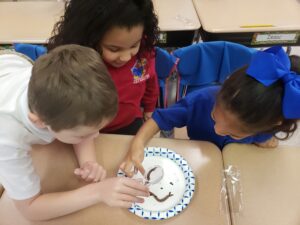 Everyone has seen an earthworm, but how much do you know about these fascinating creatures? Our workshop begins with a lively trivia game-style review of amazing earthworm facts. Lifelike “practice worms” introduce students to basic earthworm anatomy. Then, working in small groups, students measure and observe live earthworms. Finally, the earthworms are placed in a “wormery” habitat (provided by the presenter.) Follow-up materials offer opportunities for ongoing observations, documentation and research.
Everyone has seen an earthworm, but how much do you know about these fascinating creatures? Our workshop begins with a lively trivia game-style review of amazing earthworm facts. Lifelike “practice worms” introduce students to basic earthworm anatomy. Then, working in small groups, students measure and observe live earthworms. Finally, the earthworms are placed in a “wormery” habitat (provided by the presenter.) Follow-up materials offer opportunities for ongoing observations, documentation and research.
 Microgreen Gardeners – Microgreens are sprouted, edible plants that are packed with nutrients. We’ll discuss different fields of Biology before delving into Botany, the scientific study of plants. Students use digital microscopes to examine and identify the basic parts of a seed. Working in small groups, students will plant their own sunflower and corn microgreen gardens. With a little care and just the right amount of sunlight and water, their microgreen gardens will be ready to harvest and taste in just a few weeks.
Microgreen Gardeners – Microgreens are sprouted, edible plants that are packed with nutrients. We’ll discuss different fields of Biology before delving into Botany, the scientific study of plants. Students use digital microscopes to examine and identify the basic parts of a seed. Working in small groups, students will plant their own sunflower and corn microgreen gardens. With a little care and just the right amount of sunlight and water, their microgreen gardens will be ready to harvest and taste in just a few weeks.
Feathered Friends – Pennsylvania is home to more than 400 wild bird species! We’ll discuss what makes birds unique in the Animal Kingdom, examine Turkey feathers, and learn some tips for identifying our common backyard feathered friends. Each grade level receives a bird feeder to share, and all classrooms receive a Backyard Birds poster, a pair of foldable binoculars, and materials to continue observing, identifying, and documenting visiting birds.
species! We’ll discuss what makes birds unique in the Animal Kingdom, examine Turkey feathers, and learn some tips for identifying our common backyard feathered friends. Each grade level receives a bird feeder to share, and all classrooms receive a Backyard Birds poster, a pair of foldable binoculars, and materials to continue observing, identifying, and documenting visiting birds.
- Grades K-2: Volunteers don colorful bird costumes, and everyone enjoys an interactive sing-along and fingerplay.
- Grades 3-6: Students learn the proper way to use binoculars and play a game practicing their birdwatching skills.
NEW! Bees, Bugs & Butterflies: Life in a Pollinator Garden – Explore the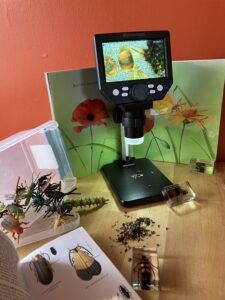 fascinating world inside a pollinator garden! Love them or hate them — bugs are amazing creatures. We’ll learn how entomologists organize bugs, and about the important role that pollinators play in growing our favorite flowers, fruits and vegetables. Everyone will make a Wildflower Seed Ball to take home or plant at school.
fascinating world inside a pollinator garden! Love them or hate them — bugs are amazing creatures. We’ll learn how entomologists organize bugs, and about the important role that pollinators play in growing our favorite flowers, fruits and vegetables. Everyone will make a Wildflower Seed Ball to take home or plant at school.
- Grades K-2: Students become little bees and act out a fun insect song, then take part in a fast-paced pollination demonstration.
- Grades 3-6: Students use digital microscopes to dissect, examine and identify the parts of a flower.
Letters of support have been received from Superintendents of School Districts across Westmoreland County, including:
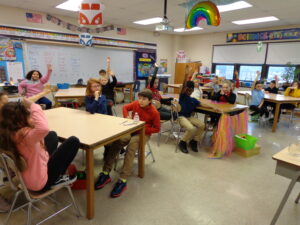
- Belle Vernon
- Derry
- Franklin Regional
- Kiski
- Latrobe
- Ligonier Valley
- Jeannette
- Mt. Pleasant
- New Kensington
- Norwin
- PennTrafford
- River Valley
- Southmoreland
- Yough
For businesses, WLT’s EITC program is an excellent way to support delivery of high-quality educational workshops to 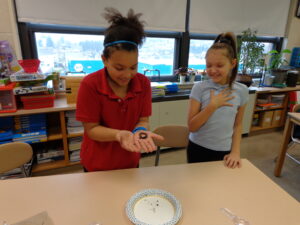
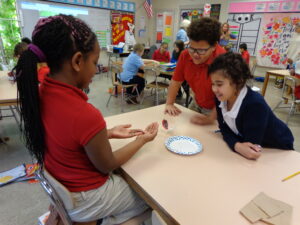 Westmoreland County schools. A business may apply for generous tax credits (90% for a 2-year commitment, 75% for a 1-year commitment, up to $750,000 annually) for commitments to the program. Tax credits are offered each year to eligible applicants on a first-come, first-serve basis; for this reason it is essential that renewing applicants apply right on May 15* and renewing applicants on July 1*. *If May 15 or July 1 fall on a weekend day, then the first business day thereafter. More information is available online.
Westmoreland County schools. A business may apply for generous tax credits (90% for a 2-year commitment, 75% for a 1-year commitment, up to $750,000 annually) for commitments to the program. Tax credits are offered each year to eligible applicants on a first-come, first-serve basis; for this reason it is essential that renewing applicants apply right on May 15* and renewing applicants on July 1*. *If May 15 or July 1 fall on a weekend day, then the first business day thereafter. More information is available online.





